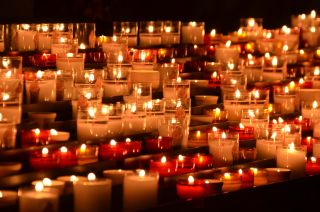Grief
How to Handle the Worst Losses in Life
No matter how unfathomable the grief, we are inherently designed to recover.
Posted April 13, 2023 Reviewed by Michelle Quirk
Key points
- When it comes to losing a loved one, we often fall prey to the “fallacy of fairness” trap.
- End of life provides an opportunity for existing networks to be revived and strengthened and new networks to be formed.
- There’s no right or wrong way to grieve, but there are healthy ways of coping with painful emotions to facilitate healing and recovery.
Grief sucks. –Everyone Ever.

We can’t all have the DNA of Wolverine or Deadpool. At some point, most of us will deeply mourn a profound loss. And no matter how unfathomable the sense of grief, we are inherently designed to reflect and recover.
Clichés from others fall woefully short and might include “She’s in a better place,” “Everything happens for a reason,” and “At least he died doing what he loved,” even if he was devoured by a shark while scuba diving. There’s no shortcut through grief, which lasts far longer than the sympathy received. It takes the time it takes, and the more you try to rush or shortcut it, the worse it can get.
Things to do today:
- Get up.
- Survive.
- Go back to bed.
- Know that it was enough.
The World Doesn’t Stop for Your Grief.
Research emphasizes many negative consequences of grief, such as physical and psychological morbidity and mortality. So, it’s vital to strive for a continuum of bereavement support via settings like workplaces, schools, social and sporting clubs, and faith communities in making connections. The end of life provides an opportunity for both existing networks to be revived and strengthened and new networks to be formed.1
No matter how much time has passed, there are still times when it suddenly becomes harder to breathe. These are called “grief attacks.” They’re not setbacks; they're a fundamental part of the grieving experience.
Be the things you loved most about the people who are gone. This is but one of the ways you never truly lose the people that you love, even in death. The people you lose stay with you in the stories you tell, in aspects of your personality, in the skills and strengths you’ve developed over the years, and in the paths you follow.
What Concrete Evidence Is There to Support Negative, Unhelpful Thinking Related to the Loss?
Usually, there is no such evidence. But this is where talking to a professional can help. If you’re suffering from guilt over something related to your lost loved one, challenge your feelings of remorse by knowing that no genuine or loving relationship can be defined by a lapse, failure, miscommunication, fight, and so on.
Our relationships are the sum of many parts. Skewed thinking can cause you to blame yourself for things outside your control. By way of perspective, in a moment of panic, the Australian quokka will throw their own babies at a predator just to escape.
When it comes to losing a loved one, we often fall prey to the “fallacy of fairness” trap where we measure things on the basis of fairness and equality, when, in reality, things don’t work that way. Your loss can feel overwhelmingly partial and undeserved. But life’s fairness is purely happenstance for every one of us.
Life: The existence of an individual human or animal.
Fair: A place where you eat deep-fried Twinkies and ride a Tilt-A-Whirl.
Embrace Your Powerlessness.
Life consistently reminds us that none of us are in control. As soon as you identify a situation over which you are powerless, economize by turning down your stress response and tapping into radical acceptance. Call a friend or fellow survivor and share your feelings of loss and helplessness. It's vital to grieve and keep moving by connecting with others and taking care of yourself.
There are no rules on grieving. And you don’t know how you will handle it until you’re in the grip of sorrow. Some people fall to their knees unable to breathe at news of a loved one’s death. While another—equally close in love and relationship to the same person—appears to go about their days largely unmoved. The difference is nothing more than what and how they externalize their grief. If you don’t allow yourself to grieve at some point, your grief will make other plans for you.
There Is Such a Thing as Good Grief. Just Ask Charlie Brown.
You can’t run from grief forever, nor fight it, nor drown it in whatever substance or behaviors you turn toward. You have to be with it. The good news is that despite the intense mental, emotional, and physical pain associated with the loss of a loved one, you were created and built to adapt and endure it.
In the case of a death and the related grief, your emotions signify to yourself and others that you need care, communion, and support. Distracting or otherwise disregarding such feelings can put you in peril. Research on avoidance indicates that suppressing and avoiding the pain ensures that the pain will continue.2 Avoid prolonged pain by avoiding avoidance.
There are, however, times when it’s healthy to distract yourself from pain, such as when you’re simply unable to process the loss or if you’re in a time and place where your ability to efficiently function is required. In such instances, you can decrease the emotional intensity for your own well-being and immediate efficacy.
Use Grief Support Resources.
Most companies have an HR person that can point you to resources for bereavement counseling—at least short term. And you can walk into almost any place of worship and find that they have regular grief support meetings held year-round. The coffee and snacks alone are worth going.
I didn’t start drinking coffee until I joined a support group. It was the best, worst coffee and powdered creamer in Styrofoam cups ever because it came with unsurpassed fellowship. And donuts.
For further assistance, do an online search of “grief support, <your city/county>” and you will find a list of resources and groups in your area. Local hospice care professionals often have resources as well. Lastly, you can contact your doctor and ask what grief support services they offer.
When I die, I hope it’s early on a weekday so I don’t go to work for no reason.
References
1. Wilkinson R, Pickett K. The Inner Level: How More Equal Societies Reduce Stress, Restore Sanity and Improve Everyone’s Wellbeing: Allen Lane; 2018.
2. Wiech, K., & Tracey, I. (2013). Pain, decisions, and actions: a motivational perspective. Frontiers in Neuroscience, 7, 46.




